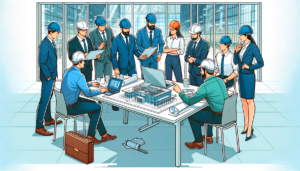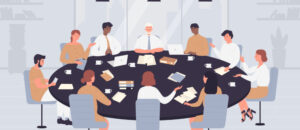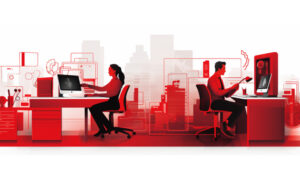Join us for HRD Collective Europe
- 7 Min Read
Join us on the 6th of October, 2022 for HRD Collective Europe when we’ll explore the strategic challenges of tomorrow. Combining roundtable and workshop learning formats, sessions will enable you to distill multiple perspectives and expertise into co-created solutions.
- Author: Elizabeth Roscoe
- Date published: Sep 13, 2022
- Categories

Committing to People First
The challenges and evolving environments that organisations are facing today are increasingly complex. With so many elements beyond our control, CHROs are tackling the ones that can be traced to one root cause – the changing needs and expectations of the workforce.
The psychological contract with employees has changed. They want to work somewhere that cares about their future – that will help them fulfill their potential, support their wellbeing in various forms, and create connections that make them feel like they belong. Without these elements in place, the best talent will vote with their feet.
If people are our greatest asset, then the need for a coherent investment strategy is not only clear, but unarguable. More so than ever, the HRD Collective is shaped around the strategies organisations are using to directly invest in their talent experience across all parts of the employee lifecycle.
The HRD: Collective is a forum for highly focused learning, fuelling people leaders with the connections and strategies to help them forge the future of work.
Join us on the 6th of October, 2022 when we’ll explore the strategic challenges of tomorrow. Combining the most impactful elements of the roundtable and workshop learning formats, our interactive sessions will enable you to distill multiple perspectives and expertise into co-created solutions.
Come prepared to share, engage, and be inspired to face the changing world of work.
Register for your free pass here
Schedule highlights
People First: How to Drive Collaboration and Creativity
In the post-pandemic, hybrid world, how can we drive collaboration and creativity in the ‘new normal’? How do we perform and transform our businesses while becoming better, happier places to work and doing more with less? How do we build the right environment and right mindset of leaders to drive performance and transformation in the new, hybrid world?
This session will explore thinking bigger, acting quicker, collaborating better and experimenting faster in the new world of work, building on current examples from Shell’s Downstream division.
Jorrit van der Togt, Executive Vice Presidnet Shell Downstream HR, Shell
Smarter Working: Taking the Next Step in the Hybrid Conversation
It is time to revisit our ideas of how work happens. The need to shift to hybrid work over the past few years has opened the doors to wider conversations around when and where we expect people to work and what options employees expect to be offered. However, hybrid working is really just one piece in the puzzle and the conversation is ready to evolve – what about fully flexible hours? Job sharing or part-time? Working asynchronously across time zones or preferred hours? We are already doing these things on small scales and case by case, but many organisations are designed around set physical places and hours as standard, and their processes and cultures reflect that. How do we rebuild to achieve smarter working and develop strategic, flexible approaches to productivity?
Lesley Wilkinson, Chief Talent Officer, Experian
Yasar Ahmad, Global Vice President of Talent, HelloFresh
Jill Cotton, Career Trends Expert, Glassdoor
Alistair Gill, Founder, CPO, Leadership Coach Alchemy Labs
Capture the Crowd: Launching a New Employer Brand
The talent market continues to be the most candidate driven it has been for some time – compounded by high turnover, new experience expectations and many organisations targeting the same skillsets. While some industries are already being drawn into wage competitions, in reality, creating a reputation as an organisation of choice is much more complicated. Have you adapted your approach to this new candidate driven environment? Is the way your organisation is presenting itself helping it stand out from the crowd?
Discussion Points
– What are the most significant trends in employee expectations? How well do they line up with your proposition?
– How are different propositions received by different demographics? Has your branding been updated for incoming generations and their values?
– Are your people truly living your EVP as an experience? How can this be translated into your external brand story?
– Is the candidate experience up to scratch? Are we giving candidates a reason to be invested from the get-go?
Outcomes
– Understand the new propositions that matter to high performing talent
– Develop frameworks for creating through-lines between your EVP and external branding
– Explore the emerging avenues for connecting with fresh talent and how to engage
Ann Perrins, VP People Strategy & Culture, GKN Automotive
The Great Reskilling: Future-Proofing Employees Through Digital Upskilling
Research suggests that more than 149 million new technology-oriented jobs will be available to the global workforce by 2025. This is a huge opportunity for businesses to start planning their futures around digital/technology-based skills, but also a huge challenge. How do we ensure we have these skills ready in our organisations on such a scale? How do we future-ready our people? To build better long-term futures for workforces and organisations, upskilling and reskilling needs to start now.
Discussion Points
– Which skills are the fastest growing and which are becoming less relevant?
– How do we create balance between digital and other kinds of skills?
– How can organisations implement upskilling and reskilling at scale?
Outcomes
– Explore the transition towards digital skills as currency
– Benchmark your upskilling strategy against other organisations
– Examine strategies to redistribute and reskill talent in your business.
Quentin Lemarié, Learning Development Director, Coursera
Turning Commitment into Impact: Keeping Momentum with Wellbeing
10 years ago conversations around wellbeing at work were not the norm. People were encouraged to deal with any issues privately and not involve their employers. We have come a long way since then, but as we continue the conversation around wellbeing at work, new areas of neglect become apparent. There can be the temptation to bring on new initiatives and programmes piece by piece as they arise, but is this piecemeal approach really serving the needs of our teams? Organisations need to develop an approach to wellbeing that is personalisable, holistic and turns their commitments into felt impact.
Discussion Points
– How can we create holistic cultures of wellbeing where changing needs are supported?
– Which wellbeing issues are personal now, but could be expected to be tackled in the workplace soon?
– How are some organisations already pushing the boundaries and offering more in unexpected ways?
– How can we apply our learnings from breaking other taboos to start these new conversations
– What skills and tools do we need to equip managers with to engage their teams on sensitive issues?
Outcomes
– Framework for re-engaging with leaders on changing trends and why we need to invest in supporting them
– Identify the characteristics of the leaders who can be the biggest advocates in your organisation
Gethin Nadin, Award-winning Psychologist and bestselling HR author
Accessible and Attractive: Updating L&D in a Digital First World
Opportunities for learning and development are quickly rising the ranks in employee priorities, as people want to see their employers invested in their futures. Over the past few years, many organisations have invested heavily in their digital learning strategies, and yet engagement is still often low and difficult to measure. So where is the disconnect? What does accessible and attractive learning look like in a digital or hybrid first contexts?
Discussion Points
– What are organisations doing to strengthen the connection between L&D and employee experience. Are we viewing investment in L&D as a retention tool?
– How do we need to adapt development opportunities for different kinds of learners and modes of working (e.g. for a frontline workforce)?
– What kinds of development investment are employees looking for?
– Is it possible to offer learning fully hybrid and/or asynchronous?
– How can we better measure the impact of learning and development for the benefit of organisations and individuals?
Outcomes
– Strategies to connect L&D to wider retention and experience strategies within the business.
– Explore best practice for digital, hybrid or asynchronous learning programmes
– Evaluate strategies to measure the impact of L&D programmes, and connect to wider business needs
David James, Podcast Host, L&D Expert The Learning & Development Podcast









